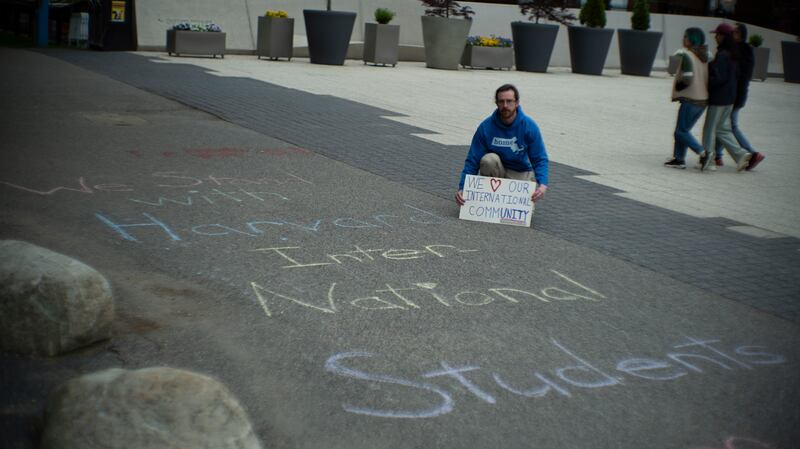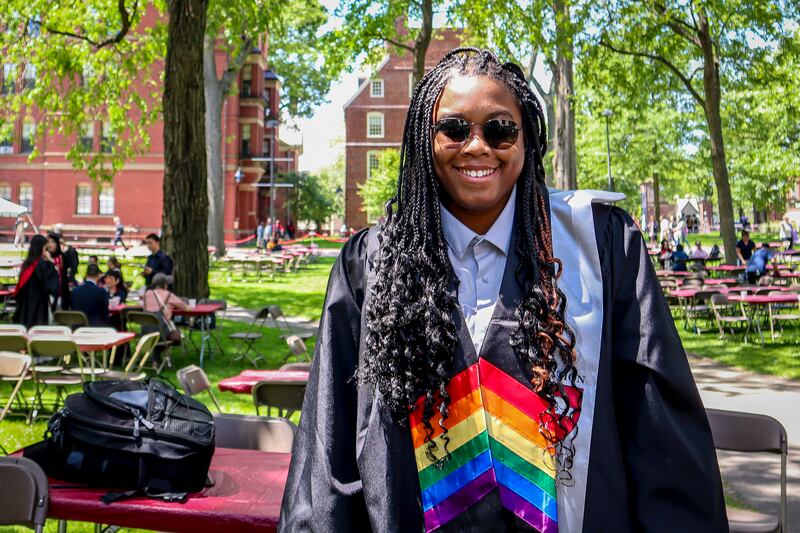President Donald Trump's administration has ordered its missions abroad to stop scheduling new appointments for student and exchange visitor visa applicants as the State Department prepares to expand social media vetting of foreign students, according to an internal cable seen by Reuters on Tuesday.
The Trump administration asked federal agencies Tuesday to cancel contracts with Harvard University worth about $100 million, intensifying the president’s clash with the nation’s oldest and wealthiest university.
The government has already canceled more than $2.6 billion in federal research grants for the Ivy League school, which has pushed back on the administration’s demands for changes to several of its policies.
A letter sent Tuesday from the General Services Administration, which oversees contracting and real estate for the federal government, directed agencies to review contracts with the university and seek alternate arrangements.
The New York Times first reported on the letter.
President Donald Trump has railed against Harvard, calling it a hotbed of liberalism and antisemitism. The school filed a lawsuit on April 21 over the administration’s calls for changes to the university’s leadership, governance, and admissions policies. Since then, the administration has slashed the school’s federal funding, moved to cut off enrollment of international students, and threatened its tax-exempt status.
Contracts include scientific research, executive training
The administration has identified about 30 contracts across nine agencies to be reviewed for cancellation, according to an administration official who was not authorized to speak publicly and provided details on the condition of anonymity.
The contracts total roughly $100 million, according to a senior administration official, who spoke on the condition of anonymity to describe internal deliberations. The contracts include executive training for Department of Homeland Security officials, research on health outcomes related to energy drinks, and a contract for graduate student research services.
Agencies with contracts that are deemed critical are being directed not to halt them immediately, but to devise a plan to transition to a vendor other than Harvard.
The letter applies only to federal contracts with Harvard and not its remaining research grants.
Trump threatens to give Harvard’s funding to trade schools
Trump laid into Harvard on social media over the weekend, threatening to cut an additional $3 billion in federal grants and give it to trade schools across the United States. He did not explain which grants he was referring to or how they could be reallocated.
The president also accused Harvard of refusing to release the names of its foreign students. In a new line of attack, he argued that students’ home countries pay nothing toward their education and that some of the countries are “not at all friendly to the United States.”
International students are not eligible for federal financial aid, but Harvard offers its own aid to foreign and domestic students alike.
“We are still waiting for the Foreign Student Lists from Harvard so that we can determine, after a ridiculous expenditure of BILLIONS OF DOLLARS, how many radicalized lunatics, troublemakers all, should not be let back into our Country,” Trump said on social media.
It was not clear exactly what the president was referring to. The federal government already has access to visa information and other records on foreign students at Harvard and other universities.
The Department of Homeland Security has demanded that Harvard turn over a trove of files related to its foreign students, including disciplinary records and records related to “dangerous or violent activity.”
Harvard says it complied, but the agency said its response fell short and moved to revoke the university’s ability to enroll foreign students. A federal judge in Boston temporarily blocked the move after Harvard sued.
Harvard rallies against the Trump administration
Trump administration officials have said some of Harvard’s international students are promoting antisemitism on campus. But the ban on international students has “nothing to do with combating antisemitism,” said Jacob Miller, a former president of Harvard Hillel, who is graduating this week with math and economics concentrations.
“Antisemitism is a real problem. It’s a problem at Harvard. It’s a problem in our country,” Miller said Tuesday at a rally outside Harvard Yard. “These policies will do nothing to combat this age-old hatred. Instead, they are designed to divide us. ... The Jewish community rejects this administration’s narrative. We will not allow our identities to be invoked to destroy Harvard.”
Harvard President Alan Garber earlier this month said the university has made changes to its governance over the past year and a half, including a broad strategy to combat antisemitism. He said Harvard would not budge on its “core, legally-protected principles” over fears of retaliation.
Harvard’s international students await further court rulings to find out whether they can enroll in summer or fall classes. Some say they’re discussing backup plans.
The government’s ban would not apply to students graduating this week, such as Jemma Liu, a Chinese student who studied landscape architecture at the Harvard Graduate School of Design.
“I hope the situation will resolve,” she said on Tuesday. “We’ll have to see what happens next. But I do feel a privileged that I can actually graduate tomorrow.”
“What the international students are caught in right now is just a limbo,” said Leo Gerdén, a graduating senior from Sweden.
Other nations respond
Japan’s government said Tuesday that it’s looking for ways to help Harvard’s foreign students. Education Minister Toshiko Abe told reporters she planned to ask Japanese universities to compile measures to support international students.
The University of Tokyo, Japan’s top school, is considering temporarily accepting some Harvard students hit by the Trump sanctions.
Universities in other countries have made similar moves, including two in Hong Kong that recently extended invitations to Harvard students.
On Harvard’s campus, law student Carson Durdel said he was proud of the university for standing up to Trump. He said intellectual independence has historically made the United States strong.
“It’s the reason we are like a beacon for the rest of the world,” he said. “I think that undermining those things, cutting those things, is not only a bad short-term view but a horrendous long-term view.”
Harvard Yard was decked out in all its regalia on Tuesday in preparation for this week’s graduation, Harvard University’s 374th.
Crimson banners adorned with “Veritas” — the school’s Latin motto, which translates to “truth” — hung from trees and between various sets of Corinthian columns. Thousands of white folding chairs were set out in neat rows facing a stage erected in front of the white-steepled Memorial Church.
On one of the few warm days that Cambridge has seen this year, thousands of smiling celebrants and their families wandered through the bucolic quads during the first of three days of graduation-related events. Some were teary-eyed watching their loved ones take pictures in their gowns.
The celebratory atmosphere, however, stood in contrast to the escalating series of actions taken by the Trump administration toward the school, with two more coming within a week of commencement ceremonies.
Last Friday, the Department of Homeland Security revoked the university’s ability to offer international student visas, an action now pending following a temporary stay from the courts. And then on Tuesday, The New York Times reported that all of Harvard’s government contracts are set to be terminated, adding another $100 million to the $3.2 billion of federal grants already cut.
The series of events cast a pall over the campus right before graduation.
“Honestly, it’s been really, really tumultuous,” said Maya Douglas, a graduating senior from the class of ‘25, who was sitting in the shade with her family near the statue of John Harvard.
A history of Trump-Harvard hostility
On April 11, the Trump administration sent a letter, later said to have been issued by mistake, outlining a series of reforms it expected the school to make to continue receiving governmental grants and contracts. The administration requested changes to governance, hiring, and admissions, addressing “egregious records of antisemitism or other bias,” prioritizing “viewpoint diversity,” and discontinuing anything DEI-related.
“The overall view is pretty simple: Harvard and other top schools are far too left-wing,” wrote Tyler Cowen, an economics professor at George Mason University, summarizing the issue for The Free Press. “The overall environment is not always kind to professors and students who are not.”
Harvard refused to comply, but its president, Alan M. Garber, said in a written statement that the school had “unfinished business” and needed to make several course corrections. Those included addressing antisemitism and anti-Arab behavior on campus.
Garber wrote, “We need to ensure that the University lives up to its ideals by taking concrete steps to reaffirm a culture of free inquiry, viewpoint diversity, and academic exploration.”
In subsequent weeks, Harvard did not comply with any of the administration’s requests. As a result, the administration cancelled billions of dollars in federal funding, paused other grants, disqualified future contracts, and threatened to revoke the school’s tax-exempt status.
Even before the cancellation of international student visas (which could affect nearly 7,000 people and cost the university substantial income) and the termination of remaining contracts, it was a lot of information for the students to juggle while finishing up the semester.
What is the mood like at Harvard?
“There’s constantly changing news,” said Evan MacKay, a sociology graduate student and teaching fellow at Harvard. “You’ll be in a meeting, and then 45 minutes into the meeting, somebody will drop another piece of breaking news.
“It’s really difficult to stay on top of everything …. ‘Oh, we hear this thing from the Trump administration. Maybe the university will sue? Maybe there will be some type of injunction?’ Who knows really what’s going on? So, there’s a lot of uncertainty,” MacKay said.

MacKay was participating in a “solidarity demonstration” on May 23 after the Department of Homeland Security's termination of international student visas. They and several other students and professors made signs and took photographs to show their support for the international student community.
“It is hard to overstate what a devastating loss the departure of our international students would be — and I don’t just mean a loss for Harvard. The very best minds from across the world come here in the pursuit of knowledge and discovery,” said Naomi Weiss, professor and chair of the Department of the Classics, in a press release.
“A lot of international students are really worried, especially because they may not be able to go here anymore,” said Douglas, the graduating senior.
Several students said they did not wish to speak on the record because they were worried about their visa status.
MacKay said there is probably a sense of relief among the students who are graduating, as they no longer have to worry about waking up to another day of news that could affect them personally. “There’s more of a sense of it casting a shadow for students who are returning, for faculty, for staff. A lot of staff are incredibly worried about layoffs and cuts in funding.”
Douglas, a chemistry major about to embark on a graduate degree program at George Washington University, said several of her friends had fellowships or campus work cancelled. But even so, she thinks Harvard is doing a great job under the circumstances. “The research that they do, in my opinion, is insane.”

And she is not worried that all of this controversy will affect her degree or her school’s reputation in the long run.
“If Harvard continues to go the way that they’re going right now with standing up for academia and high-level academics, I think the reputation will be, as Harvard’s always been, one of the biggest universities in the world,” Douglas said. “As long as they keep taking a firm stance with what they believe is right … I’ll think they’ll be fine.”

.webp)
.webp)
